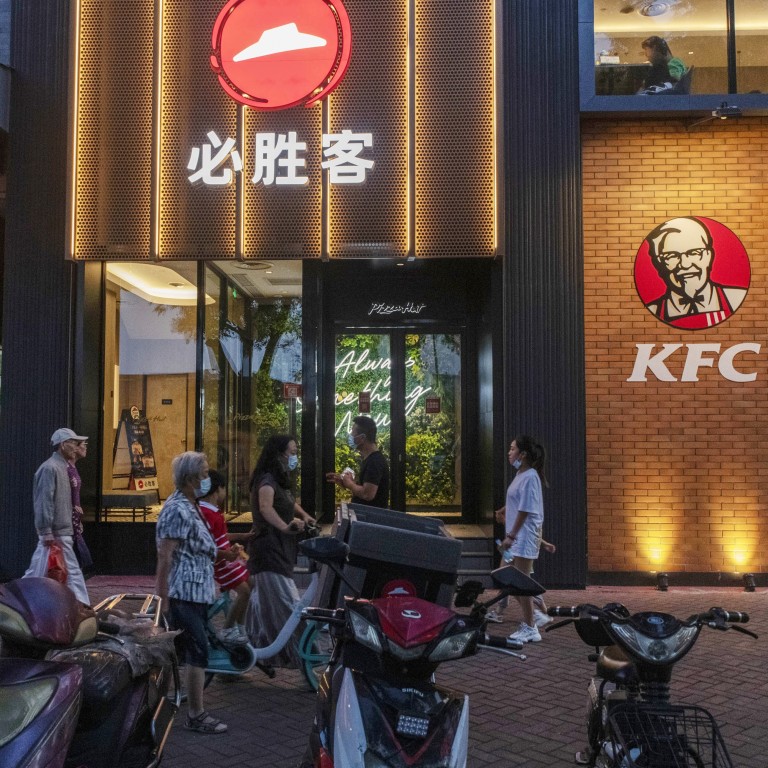
US-China relations: investment environment improving for American firms, AmCham survey shows
- Only 12 per cent of the 345 US firms surveyed by the American Chamber of Commerce in China said the investment environment was deteriorating
- This represented the lowest proportion since the question was first introduced in the 2012 survey
In a sign that China’s efforts to attract foreign investors and businesses is gaining traction, half of the American companies operating in China said the investment environment was improving, according to a survey released on Tuesday.
More than one-third of companies also said they would cut or leave their investment in China unchanged, and another 37 per cent said they would increase investment by up to 10 per cent, the survey showed.
“Here we do see a little bit of a dichotomy in the sense that the strong optimism doesn’t necessarily translate into strong investment plans,” said AmCham China president Alan Beebe.
The service sector is projected to receive the biggest jump in investment, with 40 per cent of firms set to increase investment by no more than 10 per cent, compared to 27 per cent last year.
Investment in the consumer sector is likely to decrease or maintain current investment levels, and while investment in the technology sector is set to remain at the same level of 2020, foreign businesses in the resources and industrial sector are poised to see an increase in inflows this year, the survey showed.
“For respondents planning to decrease China investments in 2021, market access barriers and concerns around an uncertain policy environment are primary factors,” the report said.
Some 44 per cent of the firms surveyed said US-China trade tensions and retaliatory tariffs did not impact their business operations in 2020, up from 37 per cent in the 2019 poll, according to the annual business climate survey.
One way to interpret this is that while the tariffs have remained in place, companies have adapted their business strategies and their operating models in order to contend with the tariffs
“One way to interpret this is that while the tariffs have remained in place, companies have adapted their business strategies and their operating models in order to contend with the tariffs,” said Beebe.
But bilateral tensions under the Biden administration are still viewed as the biggest challenge to the US business community in China, which called on Washington to refrain from engaging in aggressive rhetoric and tit-for-tat actions, while in turn appealing to Beijing to ensure a level playing field for American firms in the country.
Overall, 83 per cent of respondents said they would maintain their existing manufacturing and sourcing in China in 2021, the same level as last year’s survey, with a mere 2 per cent saying they were considering reshoring their production or operations back to the US.
“The China supply chain stood back up very quickly [from the impact of the coronavirus outbreak], and there’s been very robust economic activity [in China]. As a result, people are more confident,” said AmCham China chairman Greg Gilligan.
“If you thought about putting your supply chain somewhere else during this global pandemic, I think the results would have been very difficult for companies.”
The latest survey results come after trade ties between the world’s two largest economies dramatically deteriorated since former US president Trump started a trade war with China in 2018. Bilateral tensions increased further last year amid the coronavirus outbreak, creating tremendous shock for foreign firms in China.
Only 56 per cent of the surveyed firms generated a profit in China in last year, the lowest reading since the survey began 23 years ago, with 34 per cent reporting a drop in revenue and another fifth suffering financial losses, AmCham said.
Many coronavirus-related challenges identified in an AmCham flash survey in May 2020 remained, with international and domestic travel restrictions cited as the top virus-driven challenges for China-based business operations.

04:00
Head of World Trade Organization and former Australian Prime Minister discuss women and leadership
But despite the concerns, three quarters of the respondents held an optimistic outlook for business in China over the next two years, up from 59 per cent in the 2019 survey.
Some 61 per cent picked China as a top-three priority destination in their near-term investment plans, slightly higher than the 59 per cent in the previous poll.
Surveyed firms overwhelmingly cited rising US-China tensions as their top business challenge, and while Biden administration officials have sent clear signals that they will continue a hardline stance against China while trying to rally support from America’s allies, many AmCham members said they expected some easing of tensions in the period ahead.
I don’t feel that the new administration is increasing pressure on the relationship. To the contrary, we can expect some more normalised and more traditional measures of diplomacy
“I don’t feel that the new administration is increasing pressure on the relationship. To the contrary, we can expect some more normalised and more traditional measures of diplomacy,” AmCham China chairman Gilligan added.
AmCham China president Beebe said that it was still too early to tell the impact of the administration’s review of the vulnerability of American supply chains for critical products, which aims to reduce reliance on other countries such as China.
“It’s going to depend on what the policy requirements are that would lead companies to rethink locating some aspects of their supply chain back to the US,” he said.
Beijing has repeatedly called for a reset of bilateral relations, with officials continuing to show a desire to attract more foreign investors.
The AmCham China survey was conducted between October 21 and November 23, 2020.

